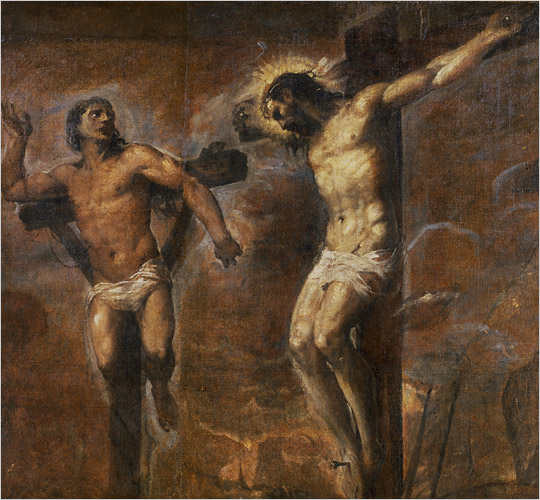Luke 23
Herod wants to see Jesus
Luke 23
1 And all the multitude of them stood up and led Him to Pilate.
2 And they began to accuse Him, saying, We found this Man turning away the nation, and forbidding to give tribute to Caesar, saying that He Himself is Christ a King.
3 But Pilate asked Him, saying, Art Thou the King of the Jews? And He, answering him, declared, Thou sayest.
4 And Pilate said to the chief priests and the crowds, I find no guilt in this man.
5 But they were urgent, saying, He stirs up the people, teaching throughout all Judea, beginning from Galilee even to here.
6 And when Pilate heard of Galilee, he asked whether the Man were a Galilean.
7 And when he knew that He was from Herod’s authority, he sent Him to Herod, who himself also was in Jerusalem in those days.
8 And Herod, seeing Jesus, rejoiced exceedingly, because for a considerable time he was desiring to see Him, since he had heard many things about Him, and hoped to see some sign done by Him.
9 And he asked Him with a considerable number of words; but He answered him nothing.
10 And the chief priests and scribes stood vehemently accusing Him.
11 And Herod, making Him as nothing with his armies and mocking, arrayed Him in a splendid cloak, and sent Him again to Pilate.
12 And in the same day Pilate and Herod became friends with one another, for before they were at enmity between themselves.
AE 684:4. …The Lord is called “Christ” because He was the Messiah whose coming was foretold in the Word of the Old Testament; for the word for Anointed is “Christ” in the Greek, and “Messiah” in the Hebrew, and a king is one anointed. This is why the Lord is called “King of Israel,” and “King of the Jews,” which also He acknowledged before Pilate. Therefore it was inscribed on the cross:
The king of the Jews (Matt. 27:11, 29, 37, 41; Luke 23:1-4, 35-40).
SD 3537. Concerning Truths, and Their Being Varied by Circumstances
I spoke with spirits respecting the position that the character of a thing is often varied by circumstances. They suppose that no absolute truth exists. And they maintain that because of the power of circumstances to alter the character of a fact, Pilate said to the Lord, “What is truth?” It was given to reply, that all the knowledges of faith are verities, that truths are eternal, and that whatever is of the truth of faith is an eternal truth; but that while circumstances may affect, they do not take away truths. As for instance, let it be granted that Adam was the first and only man, and that his sons and daughters might be joined in marriage, yet this does not nullify the eternal truth that such marriages are unlawful. Again, let it be assumed that it is better to enter into marriage in the season of youth than to have concubines previously; this does not take away the truth that as society is constituted, such marriages cannot be contracted before they are able to bring up children. So in regard to the Jews and
Gentiles; [as for instance] concerning the Jewish children who, from the persuasion of their parents that the Lord is not the Messiah, are not instructed to believe it; yet as it is owing simply to circumstances that the children cannot believe otherwise than they do, this does not abolish with them the truth, that the Lord is the promised Messiah. And thus as to the Gentiles who are in ignorance, not knowing that the Lord rules the universe; this ignorance, being a circumstance, does not preclude their being instructed in the other life, and thus saved; besides many other things. - 1748, October 11.…
AE 31:3. ...From Pilate’s question, “What is truth,” it is clear that he understood that truth was called the “king” by the Lord. But as he was a Gentile, and knew nothing from the Word, he could not be taught that Divine truth is from the Lord, and that He is Divine truth; therefore, immediately after his question,
He went out to the Jews, saying, I find no fault in him. And afterwards he put upon the cross, This is Jesus, the king of the Jews. And when the chiefs of the priests said unto him, Do not write, The king of the Jews, but that He says I am the king of the Jews, Pilate answered, What I have written, I have written (John 19:4, 19-22).
Questions and Comments
- How might we stray into an attitude like Herod’s of merely wanting to see some sign done by the Heavenly Doctrine, as a mere matter of entertainment?
- Is there truth in the idea of “situation ethics,” that is, that truths vary by circumstances? What are some truths that transcend circumstances and are always true?
- Pilate and Herod each seem to have had some good qualities. (This Herod is the son of the Herod who tried to kill the infant Jesus.) Pilate saw that Jesus was innocent and tried to persuade the Jews to let Him go. Herod earlier in his life had heard John the Baptist gladly and done many things because of his teaching. Where did they go wrong?
| previous |  |
next |
|---|


